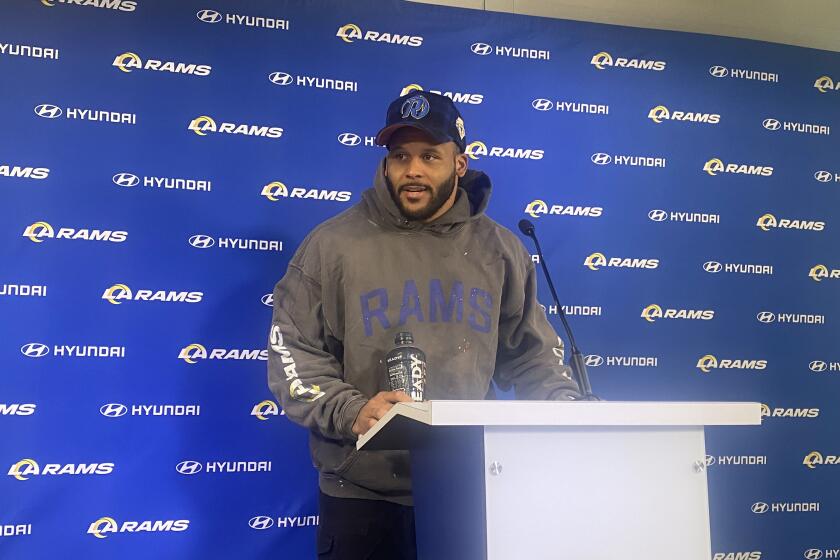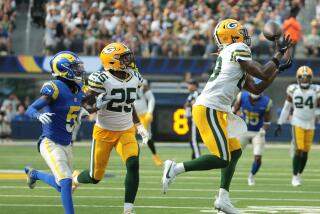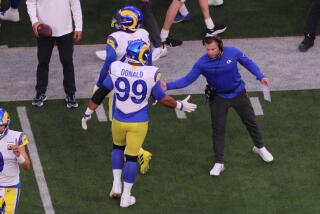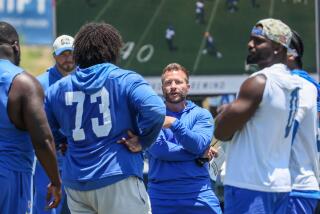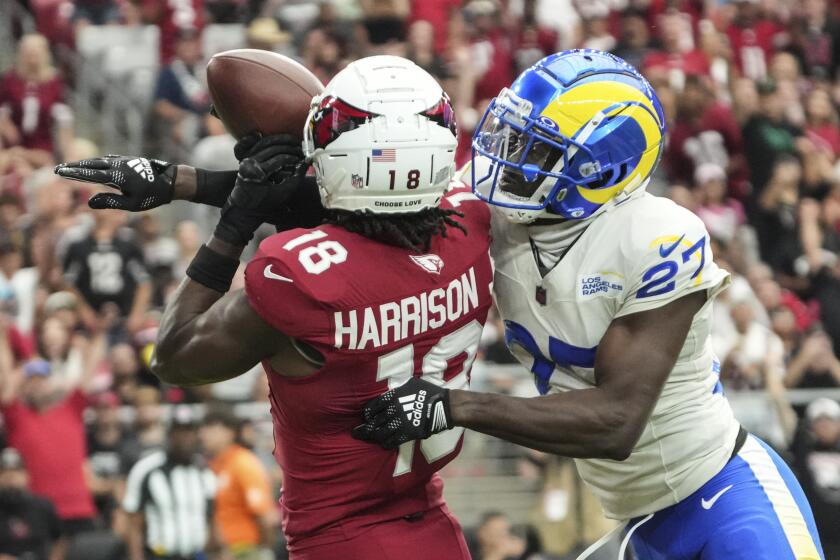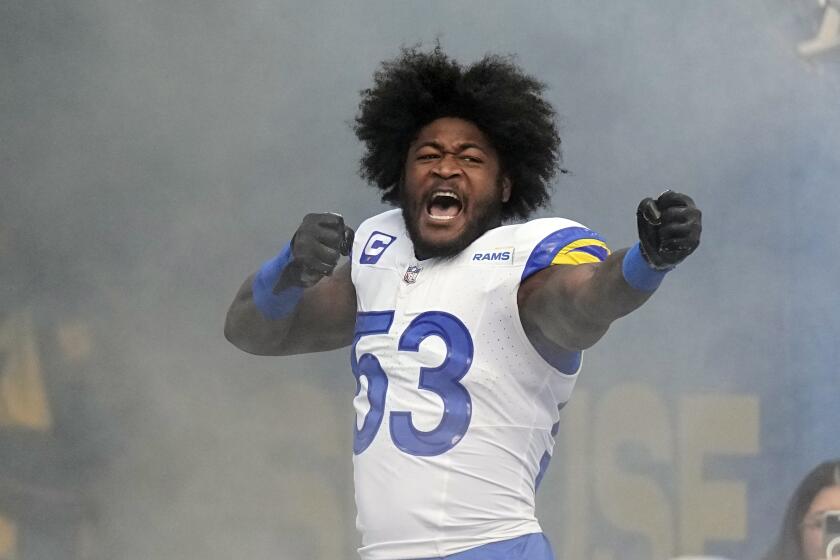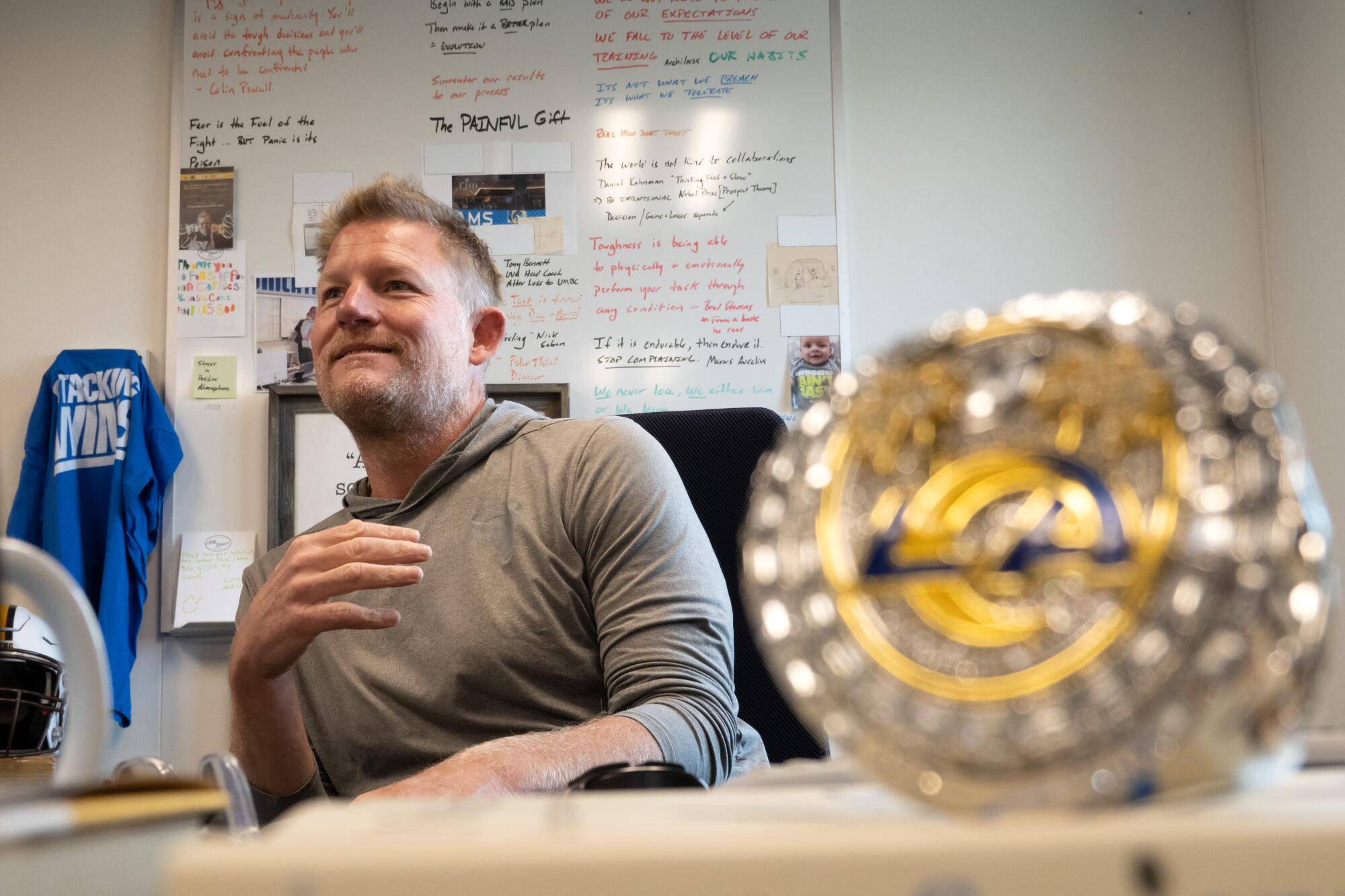
The NFL schedule release, once an uneventful moment in the minds of fans, has become a tentpole event of the league’s offseason, fodder for endless speculation online and prime-time TV coverage. It’s not the draft or Selection Sunday, but it’s gaining steam every year.
Whereas the league unveils the schedule publicly Thursday night, teams are apprised of their individual slate of games Wednesday morning, giving them at least a 30-hour jump on the rollout. That provides the franchises with an essential head start to plan travel, launch targeted social-media campaigns and sell tickets.
This year, the Rams gave the Los Angeles Times exclusive access to the early scheduling call from the NFL and all the activity that took place after it. The Rams were among the last teams contacted Wednesday morning, and a collection of department heads gathered in the office of chief operating officer Kevin Demoff for a call from Michael North, NFL vice president of broadcast planning. He read their games week by week.
There was more hand-wringing than fist pumping from the Rams.
Even after suffering his first long-term injury, Rams’ star Aaron Donald never considered retirement, saying he could not leave following such a disappointing season.
Only two games in prime time? To be expected for a team coming off a 5-12 season.
Beginning the season at Seattle then coming home to face San Francisco?
“There’s good and bad to opening up with two division games,” Demoff said. “It’s a great way to start if you win those games, bad if you don’t.”
(The Rams knew they would be on the road again in Week 3 because of an Ed Sheeran concert at SoFi Stadium that weekend. Every NFL stadium can block off one weekend per season for a non-league event.)
A potential cold-weather game at Green Bay for a fourth consecutive season? Yes, even though the Rams’ lone scheduling request to the league was to place that game in September or October. Instead, the league delivered Nov. 5.
“They were close,” Demoff said. “It’s still disappointing. To me, that’s one I thought they should have honored.”
For NFL teams, that call from the league is a starter pistol to the season. It’s the final piece needed to firm up plans and pricing for the fall.
The Rams corporate office, located in a nondescript Agoura Hills business park, becomes a bustling hive of activity. Operations scrambles to book team hotels, content specialists piece together the schedule-rollout video for social media and the sales team does last-minute fine-tuning of game pricing.

Sophie Harlan oversees operations for the Rams, so part of her job is lining up all the team hotels for road games. That’s a complicated task because, although the franchise has known for months who it will play and where, the dates of those games has been a mystery until this week.
So Harlan and her team have spent months investigating hotel options, including 97 site visits, most of them virtual. As soon as the Rams learned their schedule, operations shifted gears and began the process of securing those hotels and nearby practice sites.
“Immediately, as soon as we can go, we re-hit up all of those 97 hotels and properties and say, ‘What does it look like?’ ” Harlan said. “This is a huge focus for our ops team.”
The operations team sends confidential emails to somewhere in the range of five to 10 hotels per away game to get bids for the necessary dates. Those negotiations and ultimate decisions should wrap up around the end of May. There are also trucking and bus companies to secure, as well as police escorts for the team.
“Everybody loves shirtless Aaron Donald. Everything we post on social media that has shirtless Aaron Donald does extraordinarily well.”
— Marissa Daly, Rams vice president and general manager of media
The hotels need to be large enough to accommodate the team, of course, but not so big that players are wandering miles of hallways, searching for their meeting rooms. Sometimes, Harlan secures a luxury property — the Four Seasons in Baltimore was a team favorite — and sometimes the Rams have to make a concession.
When they played at Seattle last season, for instance, the Rams shared their hotel with a furry convention. A “furry” is someone with an interest or attraction to animals who have been given human characteristics such as the ability to talk or walk on their hind legs.
There wasn’t a big crossover between typical NFL fans and furries. The property in Seattle was huge, Harlan said, and there were very few interactions between the players and the costumed convention attendees. Except at the elevators. On occasion, players politely passed on stepping into an elevator filled with living stuffed animals and instead waited for an empty one.
In Indianapolis two years ago, the Rams shared a hotel with Gen Con, the annual board game convention. Again, not a lot of crossover.


“Watching [star defensive tackle] Aaron Donald leave the hotel to get onto a bus, next to a Viking who had no idea who Aaron Donald was, was not to be missed,” Harlan said with a laugh.
Harlan was in Demoff’s office for the scheduling call and was in constant contact with Reggie Scott, Rams vice president of sports medicine and performance, who was 10 miles away at the training facility.
If the games had fallen a certain way, the Rams were considering staying on the road between opponents. But Scott, whose decisions are based on sports science, sleeping patterns and the like, didn’t feel it was necessary to stay in the Midwest between games at Cincinnati in Week 3 and the Sunday game at Indianapolis in Week 4. On Thursday, coach Sean McVay said that has yet to be decided.
“We’re armed with every ounce of information we can have heading into getting the schedule,” Harlan said. “Then when we get the green light to go, we go.”
The social media component of the schedule release is huge, especially in the entertainment capital that is Los Angeles.
The Rams had a draft video last year in the style of an “Ocean’s 11” trailer. That went viral, as did an anime-themed schedule release by the Chargers. These are big endeavors, and they’re aimed at building the next generation of fans.
“What schedule release allows us to do is bring more people to the top of the funnel,” said Kathryn Kai-ling Frederick, Rams chief marketing officer. “I think we as marketers believe that you only have to experience SoFi once to be hooked as a Rams fan.”

Once they get their order of games, the Rams rush to develop about 200 digital assets such as slickly produced schedules that might be one size for Facebook, another size for Instagram, along banner ads, digital wallpapers and the like.
This year, the Rams’ schedule-release video is designed to look as if you’re scrolling through TikTok, with a total of nine influencers each creating a video dedicated to an individual game. There are 15 distinct videos, some more cryptic than others.
There’s Air Corgi (1.3 million followers) atop a staircase with two boxes at the bottom, one marked for the Rams and the other the Cleveland Browns, who visit SoFi on Dec. 3. The dog, betraying Cleveland’s famed Dawg Pound, knocks a football header-style into the Rams box.
There’s a pie-throwing skit featuring Rams mascot Rampage and Colts mascot Blue, who has eight million followers. The Colts play host to the Rams on Oct. 1.
“So when we went on sale with our Bills game last year, that thing took off quick. ... Within a couple minutes we were pricing that game up. We kept seeing the demand, and OK, price it up again… We want to maximize every seat and meet that supply-demand curve.”
— Dan August, Rams executive vice president of consumer revenue and strategy
There’s Alex Chipi, whose artwork on tiny cards has garnered him 4.8 million followers. He quickly creates a matchup card that features the logos of the Rams and Pittsburgh Steelers in honor of their Oct. 22 game in Los Angeles.
With the way the schedule shook out, the Rams felt some of the more interesting TikTok videos were toward the end. So to keep people watching, along with fleeting cameos by McVay and receivers Cooper Kupp and Ben Skowronek, the producers inserted a clip of their defensive star bare-chested.
“Everybody loves shirtless Aaron Donald,” said Marissa Daly, Rams vice president and general manager of media. “Everything we post on social media that has shirtless Aaron Donald does extraordinarily well.”
When it comes to prices, not all games are created equal. Fans pay a set amount for season tickets, but there’s variable pricing within that, so the in-demand game against San Francisco will have a face value significantly higher than, say, the home game against the Browns.
There’s also dynamic pricing for single-game tickets, meaning the Rams can move that number around to meet demand.
“In the past, say you bought season tickets for $1,000, each of the 10 tickets would say $100,” said Dan August, Rams executive vice president of consumer revenue and strategy. “Now it might be, ‘OK, a preseason game is $20 and a Cowboys game is $300.’ We’ll set that floor pricing that you’ll see on a season ticket; if you want to re-sell your tickets, you want to get at least that value. When we sell single-game tickets, we want to be above that price.”
Could this be done before the schedule is released? Yes, and much of the work is already done. But it matters when games take place, and that’s where the tinkering happens.
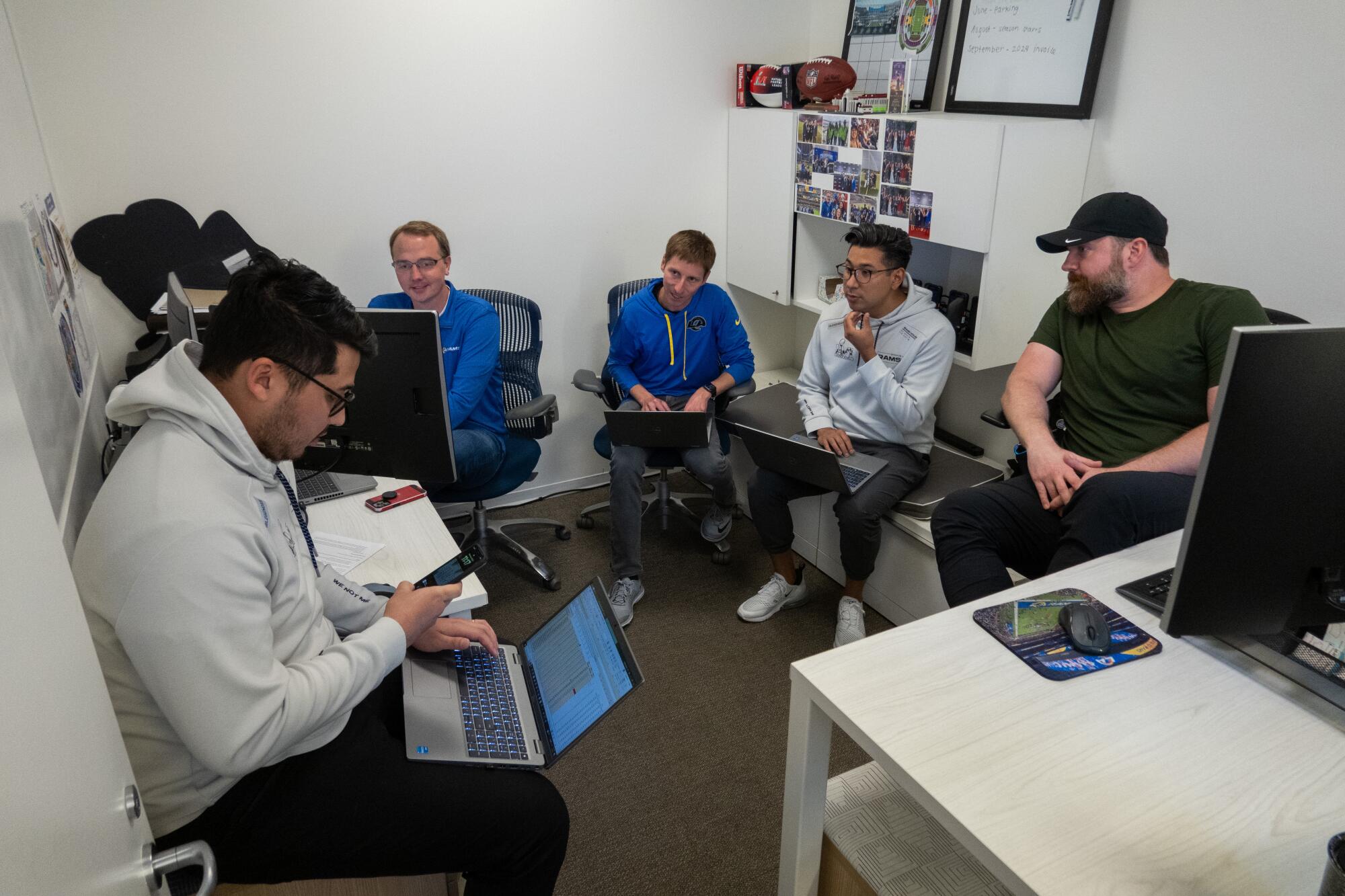
For instance, the Rams have three home games in a row, against Philadelphia, Arizona and Pittsburgh. The Eagles are the defending NFC champions, and the Steelers have a massive national following. Caught in the middle is that game against the Cardinals, which figures to be more difficult to sell. That might warrant a special halftime performance, a bobblehead giveaway or the like.
Conversely, the last scheduled home game of the season is Thursday Dec. 21 against New Orleans. The Rams nudged up the price on that because it’s a nationally televised game at the start of winter break, when a lot of Rams fans who live elsewhere and Saints fans might like to travel to Southern California.
“For the teams that are doing this best, and I don’t think every team is doing it, but you’re trying to become pricing experts,” August said. “You’re essentially placing bets on where things are going to be. You’re setting floors, which is your season-ticket price, and you’re also reading the market quickly.
The Rams 2023 schedule appears easier than last season but September will be a daunting task, especially opening with two NFC West games.
“So when we went on sale with our Bills game last year, that thing took off quick. Partially because it was announced before other games. So when it’s the only thing that’s there, everyone says, ‘Oh, wow, this is the game. It’s kickoff weekend. I need this game.’ Within a couple minutes we were pricing that game up. We kept seeing the demand, and OK, price it up again. … We want to maximize every seat and meet that supply-demand curve.”
Some kids dream of becoming NFL players. August wanted to work in sports, but didn’t have those same aspirations.
“I was always a math and numbers person, and I was addicted to sports,” he said. “At some point, the ‘Madden’ game started a franchise mode, so you weren’t just playing people in the game, you were building a franchise. I gravitated toward that.”

For all the predictions and projections, the schedule only tells a sliver of the story. Two years ago, the Rams were scheduled for a Week 16 game at Baltimore.
“We were like, `Oh, my God, we’re going to have to play [Ravens quarterback] Lamar Jackson in Baltimore in the snow,’” Demoff said. “And we got [backup] Tyler Huntley and 63 degrees.”
The Rams won, 20-19.
“You sit here today and what you actually think will happen doesn’t happen,” Demoff said.
The schedule has a way of taking many more twists and turns.
“Whatever you think today is good or bad,” he said, “usually has no bearing on the real way you feel by the time you’re actually going into that game.”

More to Read
Go beyond the scoreboard
Get the latest on L.A.'s teams in the daily Sports Report newsletter.
You may occasionally receive promotional content from the Los Angeles Times.

